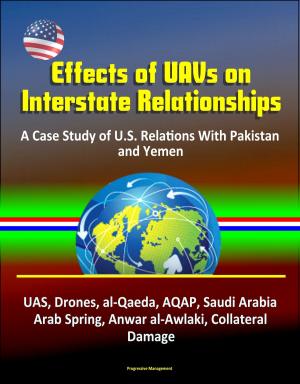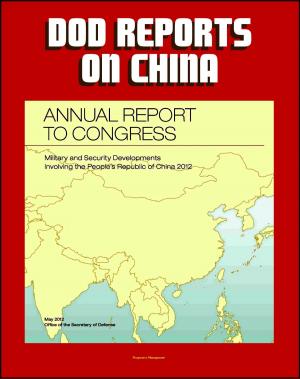Essential Guide to Catalan, Catalonia, and the Claim of Independence from Spain: Reports on Autonomy, Language, Culture, Economy, Regional Issues, Comprehensive Spanish History, and Barcelona
Nonfiction, History, Spain & Portugal, Social & Cultural Studies, Political Science, International| Author: | Progressive Management | ISBN: | 9781370850884 |
| Publisher: | Progressive Management | Publication: | October 12, 2017 |
| Imprint: | Smashwords Edition | Language: | English |
| Author: | Progressive Management |
| ISBN: | 9781370850884 |
| Publisher: | Progressive Management |
| Publication: | October 12, 2017 |
| Imprint: | Smashwords Edition |
| Language: | English |
Gain a better understanding of the ongoing crisis in Spain over the separatist movement for Catalonia. A controversial independence referendum in October 2017 plunged the nation into turmoil as the Catalan region threatens to tear the country apart. Several scholarly studies are included in this compendium about the issue. Contents include: Regionalism and Secession, The Spanish Mosaic: A Conflict Management Model for Regionalism, Spain and Its Relations with the United States: In Brief, Spain: Current Issues and U.S. Policy, and Spain: Country Study - Area Handbook Series (Excerpt).
***
Spain's imperial decline itself was not a direct cause for its failed nation-building project and the rise in Catalonian regionalism, but it allowed for regionalist sentiment to grow. Each consecutive loss of Spain's colonies struck a progressively stronger blow at the physical and emotional bonds that held Spaniards together. The decline of the empire led to a waning sense of solidarity. Small difficulties that Catalonia previously endured in exchange for access to imperial markets and potential influence in Madrid became increasingly problematic, leading to confrontations between Castile and Catalonia. This section explores the foundations of Spain's empire and assesses the impact that imperial losses had on the Spain's unity. Tying the Knot: The Foundations of the Empire - Any sense of shared Spanish identity hinged upon the people's connection to the unified crown and its associated empire, rather than on institutional ties. In 1469, Ferdinand of Aragon married Isabella of Castile to form a new dynastic union.150 This union, which led to Spain's greatest power and influence during its golden age (1517 to 1665), precluded the need for Spanish monarchs to internally consolidate their territories, failing to develop a strong notion of national identity.151 Catholicism, the only common religious and political institution served as the foundation for the unity of these two kingdoms. Furthermore, Catalonia like the other two territories comprising the Aragonese crown, maintained its own institutions. One factor that may have created resentment from the start was that Castile was the dominant partner in the marriage. The relationship favored Castile, and Castile's political leaders initially made no attempt to integrate Aragonese people or institutions. While the Crown of Aragon in the early 16th century began a slow recovery, "after centuries of expansion followed by a period of decay," beginning a slow recovery, Castile, as John Huxtable Elliott notes, entered a "period of economic and military expansion." Despite their strength, many Castilian nobles were jealous of the Catalan autonomy. Queen Isabella opined, as translated by Elliott, that "it would be better to reduce the Aragonese by force than to suffer the arrogance of their Cortes." Though she did not forcefully subdue the Kingdom of Aragon, this mentality, likely held by many Spanish nobles, reduced the trust between the two kingdoms and hindered future joint endeavors. Many Catalans perceived Castile's attempts at nation-building, regardless of Castile's intentions, as punitive measures. By the second half of the 16th century, Castilians were beginning to take the most prominent positions in government, causing Catalans, as Elliott explains, to shut "themselves off from any possibility of future cooperation with the Crown." The economic benefits of the New World also fell largely to the Crown of Castile, which administered the American possessions, given that Aragon and Castile remained separate but in name only.
Gain a better understanding of the ongoing crisis in Spain over the separatist movement for Catalonia. A controversial independence referendum in October 2017 plunged the nation into turmoil as the Catalan region threatens to tear the country apart. Several scholarly studies are included in this compendium about the issue. Contents include: Regionalism and Secession, The Spanish Mosaic: A Conflict Management Model for Regionalism, Spain and Its Relations with the United States: In Brief, Spain: Current Issues and U.S. Policy, and Spain: Country Study - Area Handbook Series (Excerpt).
***
Spain's imperial decline itself was not a direct cause for its failed nation-building project and the rise in Catalonian regionalism, but it allowed for regionalist sentiment to grow. Each consecutive loss of Spain's colonies struck a progressively stronger blow at the physical and emotional bonds that held Spaniards together. The decline of the empire led to a waning sense of solidarity. Small difficulties that Catalonia previously endured in exchange for access to imperial markets and potential influence in Madrid became increasingly problematic, leading to confrontations between Castile and Catalonia. This section explores the foundations of Spain's empire and assesses the impact that imperial losses had on the Spain's unity. Tying the Knot: The Foundations of the Empire - Any sense of shared Spanish identity hinged upon the people's connection to the unified crown and its associated empire, rather than on institutional ties. In 1469, Ferdinand of Aragon married Isabella of Castile to form a new dynastic union.150 This union, which led to Spain's greatest power and influence during its golden age (1517 to 1665), precluded the need for Spanish monarchs to internally consolidate their territories, failing to develop a strong notion of national identity.151 Catholicism, the only common religious and political institution served as the foundation for the unity of these two kingdoms. Furthermore, Catalonia like the other two territories comprising the Aragonese crown, maintained its own institutions. One factor that may have created resentment from the start was that Castile was the dominant partner in the marriage. The relationship favored Castile, and Castile's political leaders initially made no attempt to integrate Aragonese people or institutions. While the Crown of Aragon in the early 16th century began a slow recovery, "after centuries of expansion followed by a period of decay," beginning a slow recovery, Castile, as John Huxtable Elliott notes, entered a "period of economic and military expansion." Despite their strength, many Castilian nobles were jealous of the Catalan autonomy. Queen Isabella opined, as translated by Elliott, that "it would be better to reduce the Aragonese by force than to suffer the arrogance of their Cortes." Though she did not forcefully subdue the Kingdom of Aragon, this mentality, likely held by many Spanish nobles, reduced the trust between the two kingdoms and hindered future joint endeavors. Many Catalans perceived Castile's attempts at nation-building, regardless of Castile's intentions, as punitive measures. By the second half of the 16th century, Castilians were beginning to take the most prominent positions in government, causing Catalans, as Elliott explains, to shut "themselves off from any possibility of future cooperation with the Crown." The economic benefits of the New World also fell largely to the Crown of Castile, which administered the American possessions, given that Aragon and Castile remained separate but in name only.















